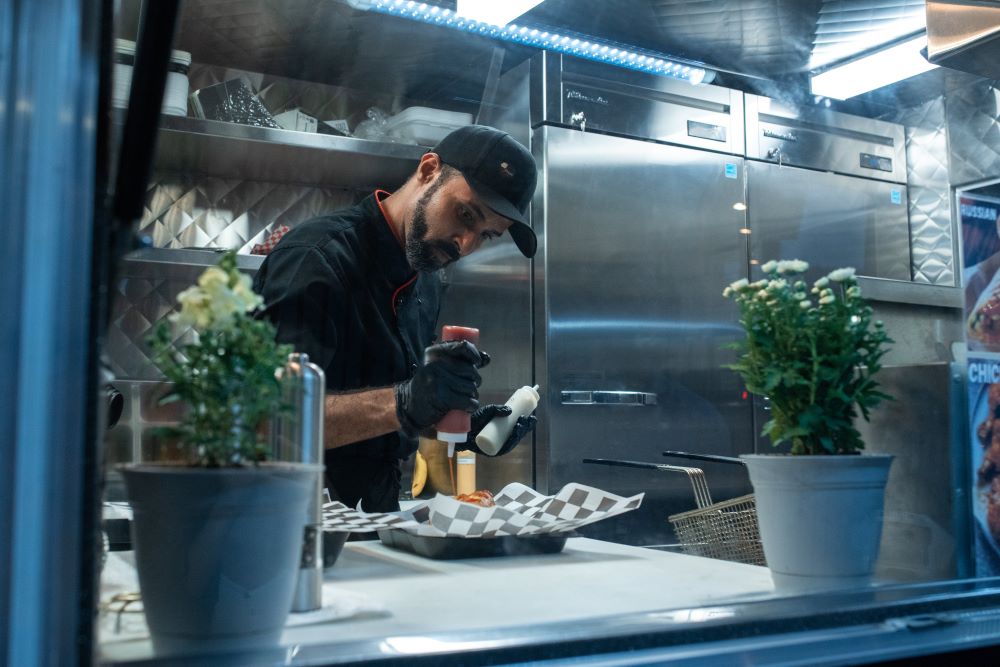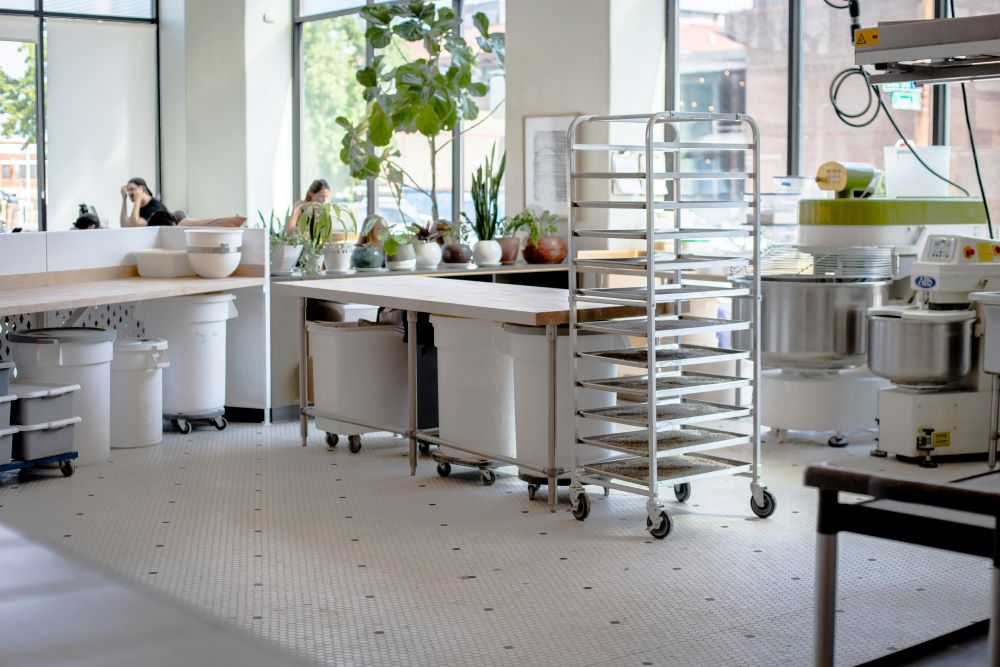
Many food truck owners use a commissary kitchen to make their operations easier. This is a great way to access more kitchen space and ensure you’re following all local laws related to food health and safety.
In this guide, we will explore whether a food truck meets the criteria of a commercial kitchen and why food truck owners may choose to rent a commissary kitchen.
Are Food Trucks Considered Commercial Kitchens?
People rarely consider food trucks as traditional commercial kitchens, but they serve as commercial food establishments.
A commercial kitchen is a dedicated space equipped for food preparation on a larger scale. It could be part of a restaurant, catering business, or any food service establishment where food is prepared for sale.
On the other hand, food trucks are mobile units that are equipped to prepare and serve food but do not have the same permanent infrastructure as a traditional commercial kitchen. Food trucks are often smaller in scale and have limited space and resources compared to fixed commercial kitchens.
What Is a Commissary Kitchen?
A commissary kitchen, also known as a shared kitchen or ghost kitchen, is a licensed commercial kitchen space that is rented out to multiple food businesses. These kitchens provide a cost-effective solution for businesses that may not have the resources or need for a dedicated, full-scale commercial kitchen.
Commissary kitchens offer shared infrastructure, equipment, and facilities, allowing multiple businesses to operate in the same space.

Are Food Trucks Required to Use a Commissary?
Whether food truck owners need to use a commissary depends on local regulations and local health department rules. In many jurisdictions, food trucks are indeed required to use a commissary, also known as a base of operations, for specific reasons related to health and safety standards.
Here are common reasons food trucks may be required to use a commissary:
- Sanitary Facilities: Food trucks often have limited space and facilities for tasks such as dishwashing, waste disposal, and proper cleaning.
- Equipment Maintenance: Commissary kitchens may have the necessary equipment for maintenance, repair, and cleaning of food preparation equipment.
- Waste Disposal: Commissary kitchens often have systems in place for proper disposal of waste, including grease.
- Water and Power Hookups: Some food trucks may not have the capacity for a water supply or power hookup that meets health department requirements.
- Storage Facilities: Commissaries typically offer storage for food supplies and equipment, addressing limitations that food trucks may have in terms of space and storage capacity.
Types of Commercial Kitchens Used By Food Trucks
If you run a food truck and are looking for a commercial kitchen space to prepare food, here are some of the top options.
Rented Space in an Existing Restaurant’s Kitchen
Some food truck operators may arrange with established restaurants to rent space in their commercial kitchens during specific hours. This allows food truck operators to leverage the existing infrastructure and equipment of the restaurant. This can be useful for storage and food prep.

Shared Space in a Commercial Kitchen
Commissary kitchens offer dedicated commercial kitchen spaces that multiple food businesses can rent, including food trucks. These kitchens provide a shared environment with all the necessary equipment for food preparation.
Private Commercial Kitchen
Some food truck operators may choose to invest in their own private commercial kitchens. This kitchen is exclusively used by the specific food truck business and may be located in a fixed or mobile structure.
Other Commercial Kitchens (Schools, Churches, etc.)
In some cases, food trucks may collaborate with schools, churches, or other institutions that have commercial kitchen facilities. This could involve renting space during non-operational hours.
Benefits of a Food Truck Commissary
Using a commissary kitchen offers various benefits for food trucks.
Shared Facilities and Resources
Commissaries allow multiple food truck operators to share the same facilities, reducing individual costs for equipment, utilities, and maintenance. The shared environment enables businesses to benefit from bulk purchasing, lowering the overall cost of supplies.
Compliance with Regulations
Commissaries are typically licensed and regularly inspected, ensuring that food trucks using their facilities meet health and safety regulations. Health department officials can inspect multiple food trucks in one location, streamlining the regulatory process.
Infrastructure Support
Commissaries are equipped with commercial-grade appliances and facilities, providing food trucks access to high-quality equipment they might not afford individually.
Commissaries often assist with equipment maintenance and repairs, ensuring that food trucks operate smoothly.

Operational Flexibility
Food truck operators can typically use commissary facilities on a schedule that suits their business needs, allowing for adaptability and efficient planning.
Shared spaces can minimize downtime between food truck services, maximizing the use of the kitchen and optimizing productivity. You also don’t have the risk of your kitchen being involved in a commercial truck accident.
Waste Disposal and Environmental Compliance
Commissaries often have systems in place for waste disposal, including grease, ensuring that food trucks adhere to environmental and sanitation standards.
Centralized waste disposal can contribute to more responsible and eco-friendly practices.
Logistical Support
Commissaries provide storage for supplies, reducing the need for food trucks to carry excess inventory and improving overall logistics. Centralized locations facilitate the delivery and receiving of goods, streamlining logistical operations.
Drawbacks of Food Commissaries
While renting a commercial kitchen offers some clear advantages, there are also potential drawbacks to consider.
Limited Control
Food truck operators may have limited control over the shared facilities, equipment, and scheduling in a commissary. This lack of control can sometimes lead to challenges in coordinating operations.
Scheduling Conflicts
Popular commissaries may have high demand, leading to scheduling conflicts, which can add a challenge to your food truck operation.
Dependency on External Factors
Food truck operators depend on the commissary’s maintenance schedules and services, potentially experiencing disruptions if the commissary faces issues or changes in its operations.
Distance from Service Locations
If the commissary is far from the food trucks’ primary service locations, transportation costs, and logistical challenges may arise.
Shared Utilities
Multiple food trucks sharing the same commissary may compete for resources such as water, power, and storage space, leading to potential conflicts.
Limited Customization
Commissaries provide general facilities that may not cater specifically to the unique needs of each food truck. This lack of customization might limit certain operational aspects.
Costs and Fees
While using a commissary can be cost-effective, there are still rental fees involved. These costs may vary, and some food truck operators might find them expensive, particularly if business is slow.
Final Thoughts
Renting a commissary kitchen should really just depend on your local laws and on how your food truck operation works. If you find the right kitchen space, it can make running your business a lot easier.
Looking for financing for a new commercial truck? Then get in touch with us at Mission Financial Services, where we make the process as easy as possible.


